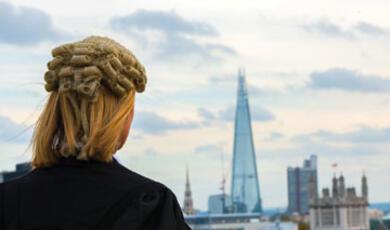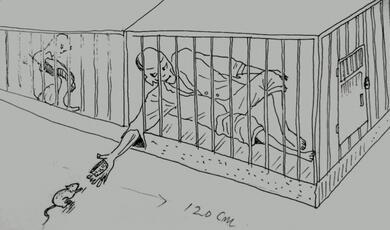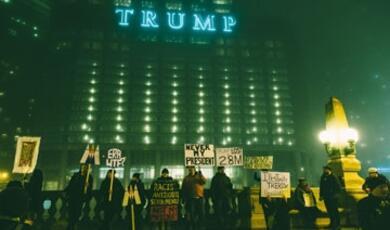The Role of the Media in Post-Conflict Societies: A Contemporary Look at Northern Ireland
Share
- Details
- Text
- Audio
- Downloads
- Extra Reading
Since Northern Ireland's sectarian politics turned to power-sharing in 1998, the country has struggled to define itself within its "peace process". The media serves as a barometer of this progress as it re-defines its own purpose within the newly formed society. Caroline Porter will look specifically at the role of different media outlets, with particular emphasis on the most popular radio shows, to see how the media becomes a player in the contemporary peace process of Northern Ireland.
Download Text
Caroline Porter
27/9/2010
Good evening ladies and gentlemen and thank you for your attention. It is an incredible privilege to have your time this evening. I consider this talk to be the final bow on a year of Fulbright learning and living and listening, and I'm excited to share the lessons and stories. That being said, the greatest joy for me would be to spur forward a strong thought or opinion and so I welcome interruptions. It means you are listening and paying attention.
To begin this evening, I'm going to start with a bit of an audible hors d'oeuvre. The first clip is taken from the BBC Archive. JB Priestley, a BBC broadcaster, reported on the small boats of Dunkirk during the Second World War. The second clip is of a contemporary BBC broadcaster, Stephen Nolan. If you would, try to identify the similarities and differences between the two clips.
These two might come across as widely varying in style, subject and purpose. But in the next few minutes, I'm going to explain to you why these both perform a public service in our broadcasting. They both champion the stories and lives of ordinary members of society. Priestley was ultimately kicked off air for his 'sentimental banalities' and criticism of the government in his show 'Postscripts'. These days in Northern Ireland, Nolan employs tabloidisation in a similar fashion. Tonight I hope to explain both the problems covering Northern Ireland and curious popularity of 'The Stephen Nolan Show'. The obvious question is one of standards for the BBC: Can tabloid, populist journalism serve the public? You already are well-aware of the monumental, sometimes terrifying, impact of the media system on our daily lives. It has the power to unite or divide, to uplift or degrade, to inform or delude. The underlying question, however, becomes one of 'and' versus 'or' in our conceptualisation of the media's role in society: Can civic connectivity and citizen journalism, buoyed by popular, tabloid tactics, add to the objective news agenda today? Empathetic and efficient journalism leads to a different quality of life. And so, if you'll oblige me, I intend to share the ways in which this year has taught me about media and its influence on quality of life.
We start in Northern Ireland, in the middle of the countryside actually. I flew from New York to Belfast last September. With cows to the left and right of me, I unpack my new life in Portstewart, a sleepy vacation town along the Northern coast of the island known for its honeycomb ice cream. My Fulbright assignment was to research the ways in which the media helps or hurts the peace process in the contrary region. We are all aware that media loves conflict, as evidenced by the coverage of recent wars like those in Iraq and Afghanistan. But what interested me was whether media loves post-conflict?
For a reminder of Northern Ireland's history, here is a brief timeline of important dates. In 1690 William of Orange defeated James II in the Battle of the Boyne. As a consequence, penal laws developed, limiting the rights of the Catholic majority in property, education and the right to bear arms. In 1921, the Government of Ireland Act led to the partition of Ireland. Six counties of primarily Protestant backgrounds remained with the UK, while the other 26 counties became the Irish Free State. Full independence came in 1949. In 1969, the British army ordered troops on the streets in Northern Ireland. Bloody Sunday occurred in 1972, and that was also the year the British government instated direct rule.
During these decades, the BBC journalism protocol generally followed the 'terrorism as cause' paradigm. Reporters were busy reporting the events of the day, rushing to the next incident, and the contextual questions of 'why' or 'how' were usurped by the immediate details of 'who' and 'when' and 'what'. At that time, the republican effort was seen as terrorism, and the BBC followed the controversial ban on Gerry Adams, laying an actor's voice over his own words. The BBC became a clear megaphone for the British government, according to the arguments of David Butler in his book 'The Trouble with Reporting Northern Ireland'. Butler came up with a term - the aperture of consensus' to describe the widening and narrowing valve for discussion, according to the government's wishes. So the token example is Gerry Adams' ban from the BBC.
In 1985 the Anglo Irish Agreement acknowledged Ireland's role in Northern Ireland, and the ceasefires of the early 1990s heralded in a new age of journalism, known by academics as 'balanced sectarianism'. In this mode, each side is given a sound byte, therefore rendering the coverage as fair to both sides. The British government softened its stance against the republican dissidents enough to hold talks, and as two academics at the University of Ulster say, 'housetrained' them, making them more acceptable for the 'civilised' society. Steve Baker and Greg McLaughlin point out in their recent book 'The Propaganda of Peace', the way in which IRA leader and nationalist Martin McGuiness was once portrayed in a BBC documentary as a family man, provoking controversy, as his unionist counterpart was shown loading his gun in the house for protection. But with the 1990s came a new theme of showcasing paramilitaries as normal people, not terrorists without voices. So the trend in reporting became 'balanced sectarianism' - in an attempt to convey objectivity in reporting. This props up official sources - like politicians, business leaders, and the power elite - without giving much voice to the 'ordinary people' of Northern Ireland.
The Good Friday Agreement came in 1998. It allowed for a power-sharing coalition and a devolved government with some powers in the hands of the Northern Ireland Assembly while others like policing and justice were devolved to Westminster.
This takes us up to the beginning of the peace process, which has entailed the country's shift from a conflict to a post-conflict region for more than a decade. While the process is overall written as a transition to 'civil' society, such as the decommissioning of IRA arms in 2005, we have seen the suspension of government from 2002-2007 and the recent spike in dissident activity.
Now we are brought up to present-day Northern Ireland, where the BBC Northern Ireland is the only region in the UK to lose out to the commercial I-TV/U-TV evening news, and the newspapers still thrive along sectarian lines. There is the Newsletter for the unionists and the Irish News for the nationalists. The Belfast Telegraph is generally assumed to take a unionist slant, but overall is the most generic offering. The official news do not report on the daily incidents of recreational rioting or sectarian harassment for the most part, as the line is blurry. When is fanning the flame of sectarian fear, and when is it reporting the realities of life in the region? The authors of 'The Propaganda of Peace' argue that the peace dividend, or the profit from peaceful economic prosperity within global capitalism', steered the public debate away from anything contentious and marginalized dissenting voices. In affluent areas of Belfast, it seems that middle and upper class concerns centre on education systems and career upward mobility - all signs of a functioning democracy as we know them today, but not on handling the remaining debris of the conflict's history. Journalist David McKittrick has reported that in the year of 2008-2009, 1500 sectarian attacks occurred. This makes for an average of 4 per day.
So my first point is that a post-conflict still has the word conflict in it. While many outside Northern Ireland might consider the conflict 'solved' I argue that it has entered a different stage, one not without conflict of another sort. My Fulbright pitch had focused on the 'post-conflict society', but I soon discovered that phrase seemed to be a misnomer. More than 10 years after the peace agreement, Northern Ireland's conflict is a raw reality and the current paradigm for reporting can sometimes neglect ordinary people and their problems on the ground. The emphasis on the peace dividend and peace process industry has meant a lack of civic connectivity in the media. Dissident activity has risen to its highest since the Good Friday Agreement, and bomb threats were daily in the fall. British MI5 forces doubled their efforts with hundreds more secret officers relocated into the area to clamp down on Irish terrorism.
While the dissident threat engages the police officers, it is sectarianism seeps into everyday living. Where you live and go to school, the way you do your hair, pronounce your 'h' sound, or call the city Londonderry or Derry - all defines you without having to label yourself. It has to do with your history and your upbringing. As someone new to the region, I was oblivious to the cultural cues that signal your tribe. But as I spent time getting to know more people and reporting on their issues and problems, it became clear enough that the peace process is a slow transition to integration.
Take PJ McClean, a Catholic schoolteacher who was twice falsely imprisoned on suspicion of republican activities. He has become a friend of the police in the area since he began working on cross community events. Yet for people in public education, the statistics are staggering. 95 percent of public schools remain segregated. Public housing hovers at the same level of separation.
Frankie Quinn is a professional photographer who recently published a collection of photographs on the peacelines. According to conflict experts, the number of interfaces has tripled in number since the ceasefires were called in the early 1990s from 27 to 88 today. Chris O'Halloran of the Belfast Interface Project defines these spots as defensive uses of public space, not necessarily just walls and fences. This is what Neil Jarman, the director of Institute for Conflict Research, has to say on the topic.
I spent a majority of my time reporting on North Belfast, where a roundabout called Carlisle Circus serves as one such interface, where Catholics and Protestants refrain from crossing over the circular road, unless to start a fight.
This trend is known as recreational rioting, and has become increasingly problematic with fewer jobs and more people walking around with time on their hands. I interviewed this man, Joe Keenan, for a story about recreational rioting. He lives on an interface in North Belfast. Keeping a log for the police, he had recorded 44 attacks on his home for the first half of the year alone. You can see the fence that boards up his windows. He says the wall was 8 inches when he moved in, and now it's 8 feet in towering height.
Here is Henry Reid, a part-time police officer and farmer in the western part of the country. When I first met him last autumn, he spoke about the habit of checking under his car for homemade bombs. During my most recent visit in August, he said an officer nearby found pieces of a car bomb. It was alarming to me to see the swift change in apprehension just in the times I'd visited.
For a review, let's look at monthly highlights since I arrived. You'll note they grow more severe as the year evolves.
• In September, a 600 pound bomb was left near the Irish border.
• In October, paramilitaries fired shots over a dissident coffin.
• In November, a 400 pound bomb was deactivated outside the Policing Board headquarters.
• In December, shots fired at a police station near the border.
• In January 2010, a dissident car bomb put a Catholic police officer in critical care.
• February witnessed the Newry Courthouse bomb and the Real IRA took credit for murdering one of its members.
• March brought a handful of alerts in Belfast, Londonderry/Derry and on the railway near the border and caused traffic problems.
• In April 2010, a hijacked taxi exploded outside the MI5 headquarters on the official day policing and justice powers transferred to Northern Ireland.
• In May, police uncovered a dissident bomb-making factory.
• Two men are caught smuggling arms into the country in June.
• July brought a rash of rioting that made international headlines, and an 18-year-old was abducted and shot in both legs.
• In August, car bombs are found under police officers' vehicles and a 200 pound bomb that exploded in Londonderry/Derry damaged local business.
• And finally, to round out the year, September this year saw more paramilitary style shootings; an 8-year-old carrying a bomb to school; and the Real IRA issued a threat against bankers in London.
Meanwhile, the police say the dissident threat has spiked to levels not seen since the Omagh bomb 12 years ago, which was considered the conflict's worst singular atrocity.
So for a quick review of the ground we have covered: The region's historical context, which is long, contentious and subjective, marked a significant change in tide with the power-sharing agreement of 1998. Since the Good Friday Agreement, the country has experienced the hiccups of a peace process, most alarmingly with the recent spike in dissident activity and the growing pains of a divided society learning how to share a common land. Post-conflict does not mean an end to the conflict, but instead a different strain of it. In this way, we must also approach the role of the media in a new light if we want to move forward and provide the best service to society. Here comes my second point.
Post-conflict Northern Ireland requires a different sensitivity in its media coverage than during the conflict itself. Just as the 'post-conflict' is not simply over, the media does not have the freedom to report just like any other civil society. It's somewhere in between and must engage the citizens. Put differently, does media keep the peace or kindle the flames? This is where Stephen Nolan enters the foreground.
But to understand how unique Nolan is, we first need to understand the complexities of reporting Northern Ireland. So we're going to play a quick game of true or false. Northern Ireland is part of Ireland - raise your hand for true, or Northern Ireland is part of the United Kingdom - raise your hand. So you get the idea. And true or false: Londonderry and Derry are different destinations. True or false: Northern Ireland and North of Ireland are the same land. True or False: Truth doesn't always keep the peace, or our attention. In light of this second point, we must recognise that media can fall prey to the fancies of the market, or lowest-common denominator entertainment news. Just look at what Americans are experiencing with the onslaught of cable news programs and 24-hour programming. Celebrities are more palatable to watch, so it makes sense that we see more of them sprinkled into our news shows.
But here is where the United Kingdom has a special privilege, the BBC. Now tack on this additional factor: Public service broadcasting is meant to inform, educate and entertain. Yes? While perhaps you may or may not believe in its greatness today, there is a lot to be said for its reputation since its beginnings nearly a century ago. Lord John Reith created the BBC with the intention of giving people what they might not even know they could love. A poor 12-year-old hears Beethoven's sonatas on the airwaves and his heart soars on new wings of possibility for his life, so inspired is he by the music. However preposterous this may seem to you, isn't that the greatest indicator of human progress - when society can work for the betterment of individuals' lives?
With these notions of great broadcasting already set in place, we turn to the issues for reporting in Northern Ireland. During the 1930s the BBC launched a regional service for the Ulster region, just as tensions were rising between the two opposing ethno-religious groups. Since then, it has - along with the press - struggled to know what to report and how to report and to whom to report. In Rex Cathcart's 'The Most Contrary Region', a history of the BBC in the region, the difficulties in finding a solid audience was clear from the beginning. Here is one quote from the book: 'Try to extend the area of discussion. Try to get people talking to one another about their problems in Northern Ireland, but remember that you must only do so within the boundaries of public acceptability. Northern Ireland is the one region in the BBC in which, out of exacerbation from broadcasting, people might kill each other and that you must avoid'. This was said by Director General Sir William Haley, to the newly appointed, post-war Controller for Northern Ireland, Andrew Stewart (1948-1952). Balanced sectarianism as a reporting construct perpetuates the divisions within Northern Ireland's society. For example, double-coded language is much discussed when it comes to Northern Ireland. Is it Londonderry or Derry? If you say Londonderry on television, you might lose the nationalists watching, and visa versa. The same goes for terms like 'freedom fighters' versus 'terrorists' or 'Northern Ireland' versus 'North of Ireland'.
But Stephen Nolan turns all of this on its head. I want to argue that he has shifted the paradigm from orange versus green to a more populist call of people against the elite, as a fat, loud and sometimes obnoxious man who talks on his morning BBC radio show about everything from earwax to police officers' pension plans. From 9 to 10:30 am every weekday morning, Stephen Nolan takes your questions. I distinctly recall the time this occurred to me. I was doing a short-term placement at the Broadcasting House in Belfast, taking short tours at a variety of news-producing outlets within the BBC. When I heard Nolan's show, the engagement with citizens, or the civic connectivity, surprised me. Press reporters and public officials call it the 'Nolanisation of the news', as he has won considerable clout over the past few years, and is the most popular radio show on the BBC Ulster airwaves. To explain what he is doing, I am going to review his primary slogans.
First, there is the nickname of 'Public Defender'. By playing up his hometown background, his issues with his weight and exercise regime, and his attachment to his mother, Nolan empathises with the everyman, as he is human just like the rest of us. He considers himself the self-anointed representative of the vox populi, and fights out against the elite in news stories. In addition, Nolan is quick to offer up his opinions. But this is one thing that might garner people's trust, honesty and transparent opinion-making. Scholars are quick to note that objective reporting does not allow people to make up their mind as much. Instead, we as an audience are told what is fair, balanced. We hear from official sources from each side, and generally that is seen as comprehensive coverage. But it does not allow the audience to decide what's balanced or fair, and this is where Nolan is different. He openly and insistently goes after 'the suits' within the BBC or the members of the elite to serve the people.
The next slogan is 'Where the People Have the Power'. His talk show is constantly buzzing with people calling in to give their opinions, and the honesty (whether crude or not) is what people trust. After spending a year in Northern Ireland studying this show, I came to expect certain reactions from different people. Middle to upper class people wrinkled their noses, while the taxi drivers couldn't turn him off their radios. So Nolan's wide audience reach is more about getting in touch with the common man of Ulster. As he says on his show, the bigger his show, the bigger people's platform to air their voices.
Finally, there is the slogan on the morning jingle, 'The Most Popular Show in the Country'. In terms of numbers, Nolan's radio show is the most popular on Radio Ulster.
So here we go, let's test Nolan against the mandate to inform, educate and entertain.
Inform: The staff of Nolan's show says they break most of their news stories from listeners' tips. The result is some quality whistleblowing local journalism. The SPED scheme, Libyan soldiers' training, the Iris Robinson interview - these are all examples of the Nolan show's place in the media scene. All of this occurs, while not even reporting from the same floor as the newsroom. One well-known politician said that listening to Nolan's show is useful for getting the pulse of the country, and for some employees in the government, a mandatory part of their job. This radio clip highlights his whistleblowing antics, and also his method of getting the stories.
Educate: In a fresh democracy, people are learning how to participate. Nolan's radio show gives an anonymous and easy way to learn how to talk back to your politicians and learn the political system. As one former broadcaster for the Nolan show put it, people for the first time are asking questions about health care and education for their children, rather than worrying about the safety of their children.
Entertain: The third aspect is the most debatable for Nolan, the issue of high standards in journalism. This is undoubtedly rather subjective, but for Nolan it seems to be pushing the standards of civility at times. During the times I spent shadowing the radio show, it was evident that a high priority is placed on getting people the 'light' material. One producer consistently commented on certain issues being too cerebral for the audience, and so they added in a story on dog walkers or on chewing apples. During an interview with the show's mastermind and editor Kevin Kelly, the paradigm of 'light and dark' came up. Kelly explained that he figured the 'light' material gets people who normally find the BBC intimidating to listen in, and then once they are hooked, manages to sneak in the more political, serious stories. This way, he says, you get the people who would listen to the serious anyway as well as those who are not apt to engage the political process. So for a country that is trying to determine how its democratic government should run, Nolan's show is a good place to start. But are we selling ourselves too short?
Ventilate: Nobel Prize poet Seamus Heaney famously said 'whatever you say, say nothing' for the general attitude of this region. People will talk to you about the weather for hours, but stay mum when the conversation turns to politics. Stephen Nolan's show is the opposite of that. With shock-jock tactics, he is brash and confrontational, and gets the arguments going. For Northern Ireland's post-conflict society, he offers a place for the public to air out their old shadows and skeletons and move on with their lives. Instead of objective, balanced sectarianism, Nolan's transparent opinion-making may serve the public in a different but also important way. Former BBC Northern Ireland Controller Pat Loughrey once said it could perhaps be a contemporary 'Athenian square'. It has bargaining power over institutions with a firm mandate from the people, and as such it represents a new Northern Ireland, one that can address both the ghosts of the past and the democratic issues of the present. Diverse opinions in a safe, anonymous fashion means people are learning how to talk about their issues instead of using violence to be heard.
So for us to do a quick round-up of that analysis, Nolan's show uses populist tactics to engage a wider reach of people in Northern Ireland. The radio show format allows for anonymous discussion, which is re-schooling people in the ways of public discourse. In addition, Nolan's transparent style, local hometown approach makes people feel comfortable with him and as a result, he often breaks important news stories and offers a place for people to ventilate their post-conflict feelings. But it comes at the cost of tabloidisation. Critics condemn the show as nothing more than lowest-denominator entertainment for Northern Ireland's society today, as Eamonn Mallie also calls it 'exploitative' and 'anathema to the role which the BBC sees itself performing'. Keeping the consequences of the show in mind, this dissertation analyses The Stephen Nolan Show's utility as a public service broadcast for post-conflict Northern Ireland. Ultimately, it highlights a tension within the public service broadcasting mandate - to unite a diverse audience of tastes and interests and to produce high quality and cultural programmes for an intellectual society. This suggests that the radio show produces a more unified public body for Northern Ireland, but it is not the highbrow public body envisioned by the BBC's creators. This is when the notion of 'and' versus 'or' becomes pertinent. While we cannot do without the objective fact-reporting, Nolan's radio show offers an explicit public service for a post-conflict society.
Okay, so we've made it to my third and final point. We began talking about the realities of a post-conflict Northern Ireland, and continued by fleshing out the complexities of reporting the region. A possible solution and analysis of The Stephen Nolan Show followed, through the lens of Reithian tenets of public service broadcasting. Now we are faced with the implications for you and me. Most people do not live in places with the fresh violence of Northern Ireland. But we do have sectarianism in our everyday lives with vicious party politics. And we do have a dumbing down of the media with the race for audience ratings, as noted by the thinner newspapers, sensational headlines and celebrity news culture. But these things are not new. What is new is the internet and the civic connectivity it inspires. In South Korea people have internet speeds that are 3 times as fast as the US or the UK. They can access internet on their mobile phones in the subway or in a taxi. In the past few months, the country was named one of the top countries in the world for education and degrees per capita. There is a phrase, bali bali, which means'faster, faster' that sums up their attitude to many things in society. They want it done immediately, whether its lunch at a restaurant or the latest download on their smartphone. What I want to challenge you all to consider tonight is the ways we can harness this same bali, bali in our civic engagement with media. Freedom of press in the US, unlike in the UK, is protected by our Constitution. Its original intention was to allow anyone to print their own opinions. The onslaught of big media companies and mergers prevented this from happening in the past century, but today we all have our printing press at our keyboards. We can have bali, bali if we want to dream it. The question is how we want to engage our society, how we want to define our society and our roles within it. When I applied for the scholarship to study, I said my goal was to give voice to the voiceless. In fact, that is the mission of the BBC World Service according to its most recent mission statement. But now, so many more people can lift up their own voices with social technology. Where do journalists fit into that paradigm? Citizen journalists - well, that is you andme - we get to decide.
©Carrie Porter, Gresham College 2010
Part of:
This event was on Mon, 27 Sep 2010
Support Gresham
Gresham College has offered an outstanding education to the public free of charge for over 400 years. Today, Gresham College plays an important role in fostering a love of learning and a greater understanding of ourselves and the world around us. Your donation will help to widen our reach and to broaden our audience, allowing more people to benefit from a high-quality education from some of the brightest minds.


 Login
Login







